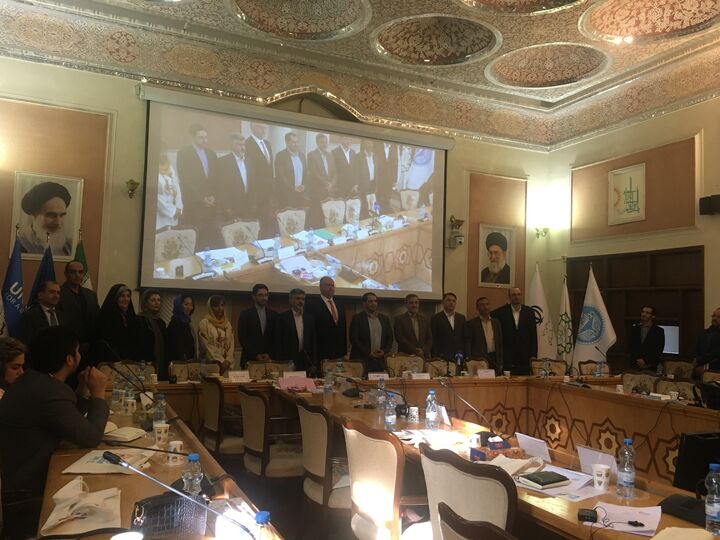Tehran, October 2 (MRUD NEWS)—The National Habitat Committee (NHC) in Iran hosted the ceremony for the celebration of World Habitat Day on October 2, 2023, in Negarestan Garden in Tehran under the theme of “Resilient Urban Economies: Cities as Drivers of Growth and Recovery”.
The ceremony is held with the cooperation of Iran Urban Regeneration Corporation, Tehran Municipality, and the UN-Habitat office in Tehran in order to share views on the improvement of human settlement and the well-being of people in urban areas particularly in dilapidated urban areas and informal settlements.
At the beginning of the meeting, there was a video message from the Executive Director of the United Nations Human Settlements Programme (UN‐Habitat), Maimunah Mohd Sharif, Iran Minister of Roads and Urban Development, Mehrdad Bazrpash, and also Tehran’s mayor, Alireza Zakani, which was read by the Secretary General of Asian Mayor Forum, Hamid Reza Gholamzadeh.
In the meeting, the Secretariat of the National Habitat Committee (NHC), Arman Khoorsand, Iran Deputy Minister and Managing Director of Urban Regeneration Corporation, Mohammad Aeeni, and Head of Tehran Renovation Organization, Mehdi Hedayat, gave separate speeches on the recent initiatives for improvement of urban areas and regeneration of dilapidated urban areas. The initiatives according to Hedayat, have led to a 62% increase in the number of renovation permits compared to the number issued last year.
Similarly, pointing to the current 1800 projects in dilapidated urban areas, Aeeni said that since August 2021 when the 13th Government came to office, the renovation of 153,000 units has been started and by now 49,000 units have already been finished.
In this event, ‘the National Strategy for ‘Empowerment and Regularizing Informal Settlement’ which has been compiled by Iran Urban Regeneration Corporation was presented. This document is now finalized and approved following the last two previous ones. In this document which will be notified to the related organizations in Iran before long, the major approach to regeneration is an integrated urban management system, public participation, and facilitation through incentive packages and land tools.
Representatives from the Japan Embassy and Korea Embassy as well as Alexander Fedulov, the representative of the United Nations Office on Drug and Crime (UNODC), the representative of United Nations Resident Coordinator Office (UNRCO) for I.R. Iran, the representative of the United Nations High Commissioner for Refugees (UNHCR), and the representative of the United Nations Development Programme (UNDP) in Iran attended the ceremony.
Alexander Fedulov speaking at this meeting said that “the United Nations continued to work in partnership with the government to respond to the national development priorities and emergent needs on the basis of key cooperation agreements”…more specifically “UN-Habitat is working in the Islamic Republic of Iran to support safe, resilient, and sustainable cities”.
In this meeting, there were also technical reports presented by affiliated organizations including Iran’s Meteorological Organization which reported on climate change and the effects on Iran’s cities. The report suggested that the increasing number of challenges facing cities including rising temperatures as well as air and water pollution need more systematic responses.
Noteworthy, in the last two years, the collaboration between UN-Habitat and Iran has been considerably promoted through NHC and affiliated organizations including Iran Urban Regeneration Corporation as embodied in BEHTAB II and the National Urban Policy Programme (NUPP I) projects respectively for improving the resilience of hospitals and achieving an integrated framework for urban planning and sustainable urbanization in Iran.
The United Nations Human Settlements Programme (UN-Habitat) is mandated by the UN General Assembly to promote socially and environmentally sustainable cities and human settlements and provide adequate shelter for all.
The United Nations designated the first Monday of October of every year as World Habitat Day to reflect on the state of our habitats, and on the basic right of all to adequate shelter.
